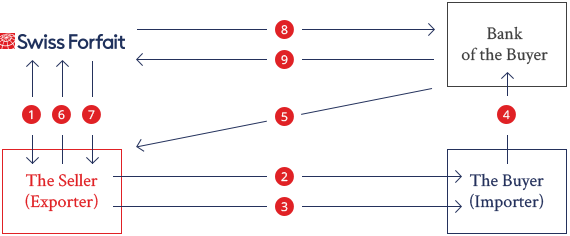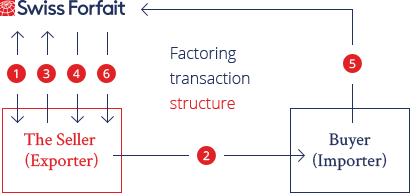Trade finance and
forfaiting worldwide
Immediate access to cash for further development
of your company
Swiss Forfait s.r.o. is a company specialized in forfaiting and it aims to provide fast and tailor made services to exporters and importers around the world.
Swiss Forfait s.r.o. was founded in 2008 by experienced professionals who have been in the trade finance, forfaiting and banking business for more than 25 years.
Advantages of our services
Each transaction is approached individually
We advise the client on the best suitable terms for payment in various countries taking into account the legal aspects of the transaction.
Free consulting
We help our clients structure the transaction to optimize their benefits.
We bear the risk
We bear the full political, credit and transfer risk of non-payment at maturity. The instruments we finance are usually purchased and discounted without recourse to the seller.
Guarantee of payment
Along with purchase and discounting, we offer confirmation on silent basis of the political, credit and transfer risk only, i.e. we guarantee to the exporter the payment under the respective instrument at maturity.





Services we provide
Forfaiting
for financing
- of medium and long term secured receivables
- on the international and domestic market
Factoring
for financing
- on international and domestic market
- of SMEs specialized in manufacturing and services (new)
- of selected infrastructure and municipal projects
Consulting:
- The important part of our business is advising our customers, which we provide free of charge
- On structured finance
- On negotiation with customers and banks



Forfaiting
Forfaiting is without recourse financing (purchase and discounting) of an eligible instrument
Swiss Forfait usually provides financing based on instruments:
- Letters of Credit with deferred payment
- Promissory Notes
- Bills of Exchange
- Account Receivables
- Loans
- Bank Guarantees
- Lease or leased back financing
- Stand-by Letter of Credit (in certain cases)
- Debt instruments such as bonds
- Overdue receivables (in certain cases)
Instruments These instruments can be issued by banks, financial institutions or corporations depending on the circumstances.
Swiss Forfait purchases or discounts the following instruments:
-
Promissory Notes and Bills of exchange
These must always be payment instruments and not security instruments. When discounted, usually documentation evidencing the shipment of goods is required (i.e. sales contracts, invoices and transport documents).
-
Letters of Credit with deferred payment
Here we can purchase and discount receivable under a Letter of Credit in the moment, when the shipment took place and the documents required under the Letter of Credit are presented and accepted by the payment domicile – usually the opening bank (the bank of the importer).
-
Loan/Credit agreements
This instrument is used in countries, where use of e.g. Promissory Notes or Bills of Exchange is legally not possible or is administratively very difficult. Having documentation evidencing the shipment of goods is required.
-
Bank guarantees
In order to discount a bank guarantee, it has to be an irrevocable, unconditional and freely transferable instrument. A Bank Guarantee can be issued in connection with e.g. Account Receivables, Promissory Notes / Bills of Exchange etc.
-
Account and trade receivables
Here we require bullet-proof evidence of the existence of the receivables. Among other things an acknowledgment by the debtor must always be available. Also documentation evidencing the shipment of goods is required.
-
Other instruments
Lease or leased back financing, Stand-by Letter of Credit, Debt instruments, such as bonds, Overdue receivables (in certain cases).
Principles of Forfaiting
- Forfaiting is based on assignment of receivable from the side of the seller to forfaiting company (Forfaiter) under pre-agreed terms.
- Immediately after conclusion of a contract, presentation and acceptance by the Forfaiter of the required documents, the Forfaiter pays the purchase price of receivable (minus agreed discount) and the seller has an immediate access to cash which he may further dispose of.
- Forfaiting supports the development of international trade as it helps to eliminate the risks arising from it.
- Forfaiter takes on all the above-described risks associated with the transaction, which also increases the willingness of suppliers to enter new markets.
- Obligations associated with the quality of supply (guarantee conditions) etc. remain responsibility of the Seller.
Cost of Forfaiting
The cost is completely individual for each receivable.The most efficient is to contact us in the early stages of a transaction when the payment terms are discussed with the buyer and forfaiting cost can be included in the total cost of the delivery.
Cost is based on:
- Solvency of the borrower (bank or company)
- The amount of the Receivable
- The nature of the Receivable
- The (deferred) maturity of the Receivable

Advantages of Forfaiting
Main advantages for the importer
- Deferred terms of payment
- Much faster procedure of transaction negotiation and realization compared to financing with the state support via ECAs
- Financing of 100% of the contract value
- Financing at fixed rates
Risks taken by the Forfaiter
- Credit risk – By purchasing the receivable, the forfaiter assumes the risks of non-payment, i.e. the inability or unwillingness of the other party to fulfill its obligations.
- Political risk – The risks of the country where the trade happens include political risk and cross-border risk.
- Transfer risk
Main advantages for the exporter
- High competitiveness due to deferred payment terms which can be offered to customers.
- Immediate cash right after shipment / take-over
- Faster cash flow. The exporter does not have to wait for the maturity date and can immediately use the funds for other business goal achievement..
- Mitigation and transfer of payment risk (credit, political and transfer risk) to the Forfaiter.
- Fixed price.
Procedure of purchase of receivable and discounting
- The Seller (Exporter) provides us with basic details of the transaction and copies of documents
- After checking the information provided our company issues indicative terms under which the receivable will be purchased and discounted.
- The Forfaiter and the Seller sign a Forfaiting contract. The Forfaiting contract involves a specific receivable, the cost of purchase, defines the necessary documentation and the agreed implementation date. The most efficient is to contact us at the early stages of a transaction when the payment terms are discussed with the buyer and forfaiting cost can be included in the total cost of the supply.
- The Seller delivers goods and assigns the receivable to the Forfaiter.
- When the documents are completed and verified, we calculate the discount (if the costs of forfaiting are not included in the total costs) and pay the net proceeds according to the payment instruction of the Seller.
- The Forfaiter receives the nominal amount of Receivable from the buyer, or bank of the buyer at maturity.
Tenor
- short-term financing ranges from 60 days to 1 year
- medium term financing up to 5 – 7 years
- long-term financing there are specific cases, where the tenor can reach 10 or more years
Structure of a Forfaiting Transaction
The instruments we finance are usually purchased and discounted without recourse to the Seller

- Forfaiting contract on a specific receivable
- Contract between the Seller and the Buyer
- The Seller delivers goods to the Buyer
- Bank of the Buyer provides the Forfaiter with required documents
- Bank sends documents to the Seller
- The Seller provides the Forfaiter with these documents
- Forfaiter pays the amount of Receivable to the Seller
- Before the maturity date the Forfaiter presents documents to the bank of the Buyer
- Bank of the Buyer pays in favor of the Forfaiter
Country list
The following country list indicates the usual possibilities for Swiss Forfait.
The maximum length of a credit in a given country is assessed on a case-by-case basis.
- Albania
- Armenia
- Belarus
- Bosnia and Herzegovina
- Bulgaria
- Croatia
- Cyprus
- Czech Republic
- Estonia
- Georgia
- Greece
- Hungary
- Latvia
- Lithuania
- Macedonia
- Malta
- Moldova
- Montenegro
- Norway
- Poland
- Romania
- Russia
- Serbia
- Slovak Republc
- Slovenia
- Switzerland
- Turkey
- Ukraine
- Other EU countries
- Algeria
- Angola
- Bahrain
- Benin
- Cameroon
- Chad
- Congo-Brazzaville
- Cote d'Ivoire
- Democratic Republic of Congo
- Egypt
- Eritrea
- Ethiopia
- Gabon
- Ghana
- Iran
- Iraq
- Israel
- Jordan
- Kenya
- Kuwait
- Lebanon
- Libya
- Mali
- Morocco
- Mozambique
- Namibia
- Nigeria
- Oman
- Qatar
- Rwanda
- Senegal
- Saudi Arabia
- Sierra Leone
- South Africa
- Tanzania
- Togo
- Tunisia
- Uganda
- United Arab Emirates
- Zambia
- Australia
- Azerbaijan
- Bangladesh
- Cambodia
- China
- Hong Kong
- India
- Indonesia
- Japan
- Kazakhstan
- Malaysia
- Mongolia
- Nepal
- New Zealand
- Pakistan
- Papua New Guinea
- Philippines
- Singapore
- South Korea
- Sri Lanka
- Taiwan
- Tajikistan
- Thailand
- Turkmenistan
- Uzbekistan
- Vietnam
- Argentina
- Bolivia
- Brazil
- Canada
- Chile
- Colombia
- Costa Rica
- Dominican Republic
- Ecuador
- El Salvador
- Guatemala
- Haiti
- Honduras
- Jamaica
- Mexico
- Panama
- Paraguay
- Peru
- Puerto Rico
- Trinidad & Tobago
- Uruguay
- USA
- Venezuela
Factoring
Factoring is a type of financing of usually short-term credits provided for the supply of goods and services, where the supplier provides the buyer with deferred payment

- Factoring agreement
- Supply of goods/services
- Assignment of receivables*
- Financing of receivables
- Payment on due date
- Settlement of remaining amount of receivables
The basic instrument here is the invoice. Factoring usually distinguishes between recourse- and non-recourse factoring.
Factoring services that we offer are based on purchase of a short term account receivables usually with recourse against the original supplier/creditor. The basis of a factoring transaction is Factoring agreement which stipulates terms and conditions for both parties.
We offer services of purchase of receivables to the small, medium and large companies with annual turnover from 1 million EUR, which supply goods or services on a regular basis to its foreign and domestic customers and provide them with an extended maturity of 30-90 days.
Very popular is factoring of services in the area of transportation etc.
The difference between forfaiting and factoring
At a first glance, these two services may seem interchangeable, but in reality they differ in their substance, concept and extent.
| Forfaiting | Factoring | |
|---|---|---|
| Substance | Purchase of short-term, medium to long-term receivables with deferred maturity | Purchase of short and very short receivables |
| Type | Usually without recourse | With or without recourse |
| Financial coverage of Receivable | 100 % | 80 - 90 % |
| Cost | Forfaiting costs can be included in the total cost, i.e. it is paid by the buyer | Factoring costs are borne by the seller |
| Secondary market | yes | no |
Credit financing and pre-financing
In certain cases, we provide short-term credit financing for particular commercial cases under individually tailored conditions. It can be also a bridge loan.
We also offer pre-financing to eligible customers, especially in cases where, for example, it is necessary to finance the production of certain goods. The repayment of pre-financing will be then made by payment of the assigned receivable by the final customer.
Advantages of credit financing we provide
- Minimum required documents
- Quick assessment
- Higher amount of financing in case of real estate collateral
- No penalties for early repayment
- Individual approach to each particular transaction
Cost of financing
The interest rate on provided loans is always tailored to a particular business case.
The cost of financing depends on:
- Loan amount
- Maturity
- Type of collateral provided
Loan amount
The amount of the loan granted depends on type of transaction, maturity and collateral provided, which may be, for example, Promissory Notes, Real estate etc.
Maturity
The repayment period is set individually and you can repay the loan early without any penalties.
- We currently provide credit financing with a maturity of up to 1 year.
About us
Swiss Forfait s.r.o. is an independent non-bank financing institution.
We finance international and domestic trade, predominantly in the form of forfaiting. Swiss Forfait s.r.o. was founded in 2008 and it is a sister company of SF Finance.
Swiss Forfait s.r.o. has two executives, both of them are multi-lingual speakers, each concentrating on a different geographical area of business.
Swiss Forfait s.r.o. is also the member of The Economic Chamber of the Czech Republic, International Trade and Forfaiting Association and International Maritime Bureau (IMB).




The company Swiss Forfait s.r.o. has neither common capital structure, nor any relationship with the company called Swiss Forfait Middle East LLC, Dubai. Therefore Swiss Forfait s.r.o. is not responsible for any business or any activity of Swiss Forfait Middle East LLC, Dubai.
Dubai
In 2014 we opened representation of our company in Dubai in the United Arab Emirates.
Our Dubai office provides marketing, advisory and intermediary services in the area of trade finance, forfaiting, export and import operations, purchase and sale of goods for Swiss Forfait s.r.o. We are able to find local distributors and business representatives for interested parties from Czech and Central European manufacturers.
The office covers the area of Near and Middle East and north Africa (countries within GCC, Iraq, Jordan, Egypt, Libya, Algeria, Morocco), Indian subcontinent (Pakistan, India, Bangladesh) and selectively also markets of sub-Saharan Africa.
Dubai office contact details:
Swiss Forfait s.r.o.
2010, 48 Burj Gate Tower
Downtown Dubai
UAE
+971 4 518 2520
+971 55 867 5634
mikula@swissforfait.com
Contact
+420 224 247 321
+420 224 211 121
Please contact us for quotations, conditions, or financing involving any country in the world.
We will be pleased to advise you on the best possible options and payment terms for your concrete case.
Balli
Směnky Balli Group PLC a plnění pojišťovny Credendo/Kupeg
Společnost Credendo – Short-Term EU Risks úvěrová pojišťovna, a.s. (dříve KUPEG úvěrová pojišťovna, a.s.) po více jak 9 letech soudního sporu uhradila pojistné plnění ve prospěch České spořitelny v případu Balli Group. Úhrada proběhla v plné výši a to 539.236.567 Kč (hodnota směnek) a úroky z prodlení ve výši 401.975.007 Kč. a náhradu škody 12.737.320 Kč.
Toto plnění poskytla v důsledku pravomocných rozsudků, které rozhodly v její neprospěch a které přikládáme.
Uvedené vlastní směnky vystavené společností Balli Steel Czech s.r.o. a avalované Balli Group PLC prodala Swiss Forfait bez postihu České spořitelně v roce 2012 včetně uvedeného kreditního pojištění. ČS před tím pravidelně odkupovala obdobné směnky po více jak 7 let a byly vždy řádně uhrazeny.
V roce 2013 se však společnost Balli Group PLC se sídlem v Londýně dostala do insolvence a ČS se přihlásila o pojistné plnění, přičemž Credendo odmítla plnit. Proti žalobě se Credendo bránila všemi prostředky, mimo jiné včetně trestního oznámení na jednatele Swiss Forfait.
Všechny soudy, tedy Městský soud (příloha 1), dále odvolací Vrchní soud (příloha 2) a konečně i 2x Nejvyšší soud (příloha 3 a 4) jednoznačně určily jako předmět pojištění vlastní směnky a odsoudily Credendo k úhradě zadržovaného plnění včetně úroku z prodlení.
I přes délku trvání 9 let, tento civilní spor potvrdil důležité vlastnosti směnek, kdy při prodeji směnka představuje abstraktní bezpodmínečný závazek. Současně soudy odmítly významný pokus se vyhnout plnění z pojistné smlouvy uzavřené mezi Swiss Forfait a pojišťovnou Credendo.
Datum: 20/12/2024
Swiss Forfait s.r.o.
Přílohy:
příloha 1, příloha 2, příloha 3, příloha 4
